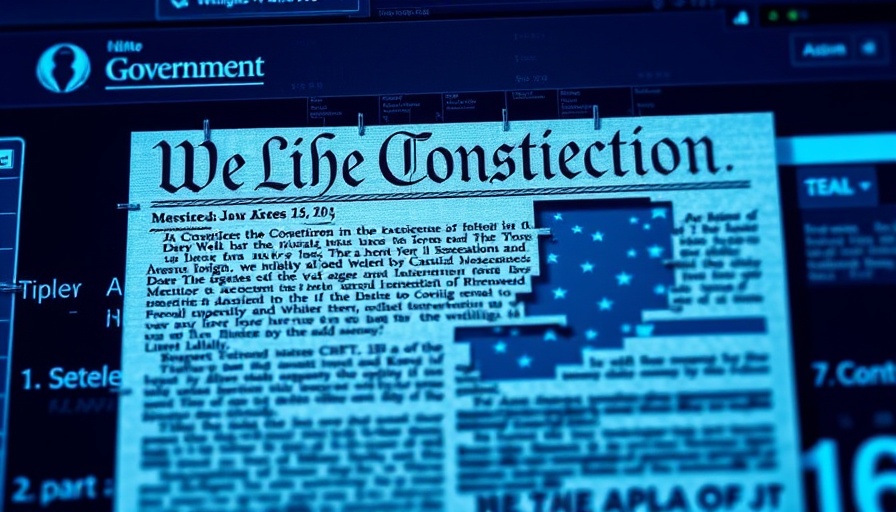
Constitutional Sections Missing: What Happened?
Recently, several critical sections of Article 1 of the U.S. Constitution vanished from the official government website, sparking widespread concern and speculation. These changes, which were noted by internet sleuths, were traced back to the past month, as revealed by archival snapshots from the Wayback Machine. Removing legislation that defines congressional powers compromises transparency, raising questions about what this means for citizens' rights.
Among the content missing are important sections of Section 8, alongside the complete deletion of Sections 9 and 10. These sections fundamentally address Congress's powers and the restrictions placed on individual states, including vital protections such as habeas corpus, which safeguards citizens against unlawful detention. The unexpected absence of such critical content underscores the importance of maintaining open access to foundational legal texts.
What Does the Removal Mean for Citizens?
Though a Library of Congress spokesperson stated that the amendments resulted from a “coding error” and would soon be rectified, the incident draws attention to a more significant concern: the implications of altering legal texts on a public platform. While this does not directly affect U.S. law, it raises alarms, particularly in light of former Trump administration official Stephen Miller's earlier threats regarding habeas corpus. The context suggests a larger narrative surrounding civil liberties, access to information, and government accountability.
Public Reaction and Future Implications
The reaction online has been varied, fueling discussions on forums such as Reddit. Users are questioning the integrity of the U.S. government website and demanding explanations. Many see this situation as a severe lapse in trust, leading to distrust about the reliability of publicly available legal documents. If citizens cannot depend on official channels for accurate representations of their rights, it raises troubling concerns about governmental transparency.
Historical Context: The Importance of the Constitution
Understanding the significance of these eliminated sections requires delving into the historical context of the U.S. Constitution itself. Initial attempts to create a strong federal government faced challenges from states protective of their autonomy, culminating in a framework intended to balance power. The Articles of Confederation, which preceded the Constitution, highlighted the weaknesses that this new framework sought to address. Omitting portions that define Congress's powers and limitations risks undermining that balance and diluting essential checks and balances.
Legal Experts Weigh In: Diverse Perspectives
Legal scholars have varied opinions on the accidental removal of these sections. Some argue that while it may stem from an innocent mistake, the frequency of such oversights can indicate systemic issues needing attention. Others maintain that regardless of intent, any alteration without transparency can contribute to erosion in public trust. The consensus remains that clarity and access to constitutional texts should be preserved to ensure all citizens can understand their rights and responsibilities.
Actions for the Public: Paths Forward
In light of this incident, it’s crucial for individuals to remain vigilant about their rights. While waiting for corrections, citizens can access resources such as alternative legal databases and public libraries to review the Constitution. Engaging with local representatives to express concerns about transparency can also encourage accountability. Awareness is key; citizens should advocate for the integrity of governmental operations.
Concluding Thoughts: Why This Matters
The recent removal of significant constitutional sections serves as a reminder of the ongoing need for transparency within government entities. These events indicate how easily trust can be undermined, especially concerning foundational documents that ensure citizens understand their rights. As the situation develops, citizens should demand clarity from their representatives and continue to engage in informed discussions surrounding their rights. Remaining proactive and vigilant can ensure that the constitutional rights of all individuals are respected and safeguarded.
 Add Row
Add Row  Add
Add 



Write A Comment